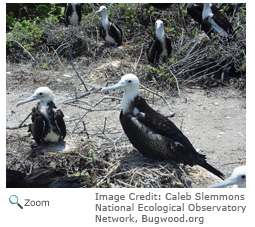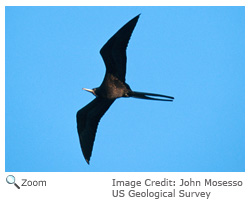Magnificent Frigatebird - Fregata magnificens |
|||||||||||
Description Range Habitat |
DietThe magnificent frigatebird eats small fish, squid, jellyfish, and crustaceans. It may also take young turtles, birds, and eggs. Life Cycle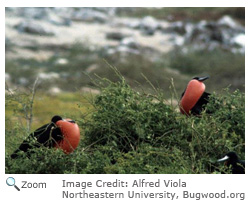 Frigatebirds nest in colonies. Male frigatebirds inflate their red throat pouches to attract a mate. The female frigatebird lays one egg in a nest built of sticks, usually in a clump of mangrove. Sometimes the nest is built in a tree, bush or on the ground. The nest is built by the female. The male brings the materials. Frigatebirds nest in colonies. Male frigatebirds inflate their red throat pouches to attract a mate. The female frigatebird lays one egg in a nest built of sticks, usually in a clump of mangrove. Sometimes the nest is built in a tree, bush or on the ground. The nest is built by the female. The male brings the materials.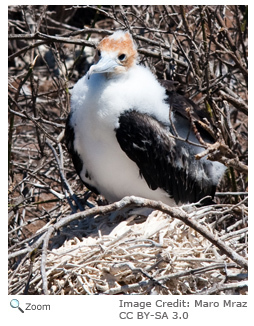 It takes about 50 days for the chick to hatch. Both the male and the female incubate the egg and both parents feed the chick. When the chick is young, one parent is always with it to protect it from the other frigatebirds. The male leaves when the chick is about 12 weeks old. The chick fledges when it is about five to six months old. The female will continue to feed the chick for another four months. It takes about 50 days for the chick to hatch. Both the male and the female incubate the egg and both parents feed the chick. When the chick is young, one parent is always with it to protect it from the other frigatebirds. The male leaves when the chick is about 12 weeks old. The chick fledges when it is about five to six months old. The female will continue to feed the chick for another four months.
Behavior |
||||||||||
Audio Credit: xeno-canto.org Sandra Gallo-Corona |
|||||||||||

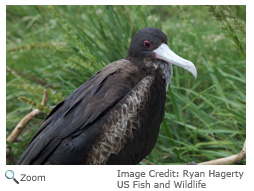
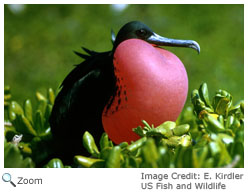
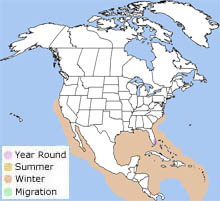 During breeding season, the magnificent frigatebird is found in coastal Florida and in the tropical Atlantic and Pacific Oceans. In the non-breeding season, it is found from the coast of North Carolina south to Florida and west to Texas. The magnificent frigatebird is also found on the coast of California.
During breeding season, the magnificent frigatebird is found in coastal Florida and in the tropical Atlantic and Pacific Oceans. In the non-breeding season, it is found from the coast of North Carolina south to Florida and west to Texas. The magnificent frigatebird is also found on the coast of California. 